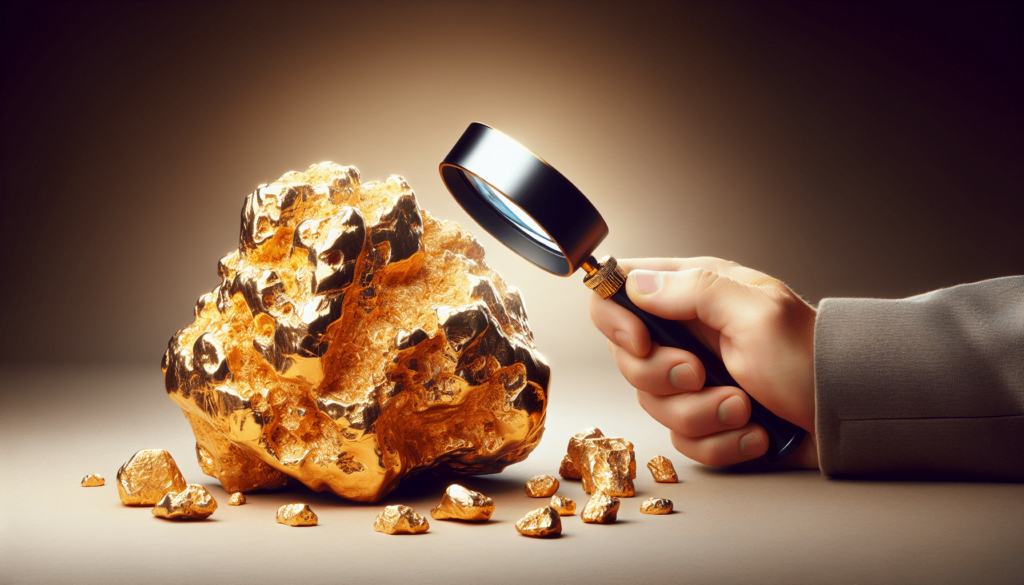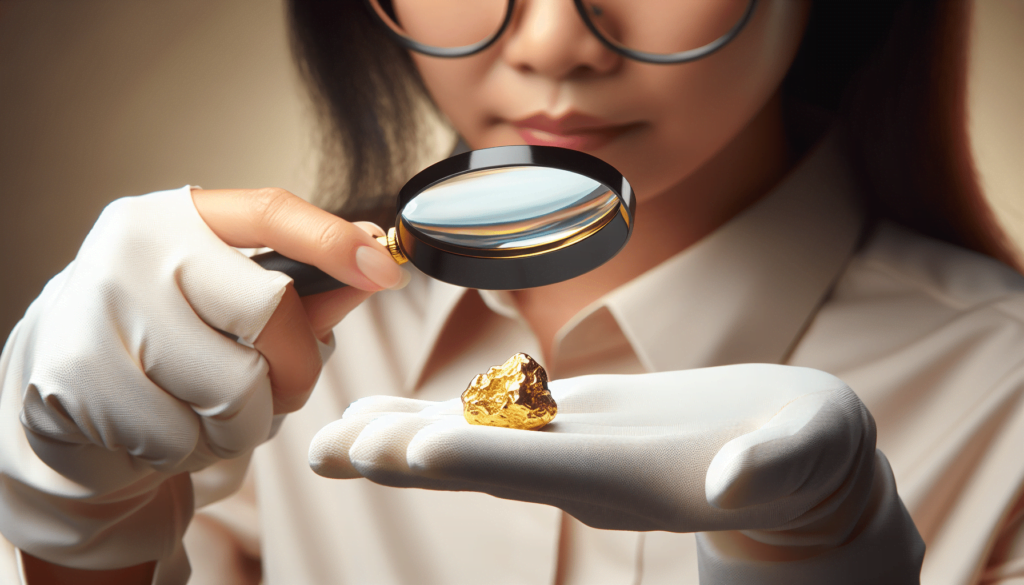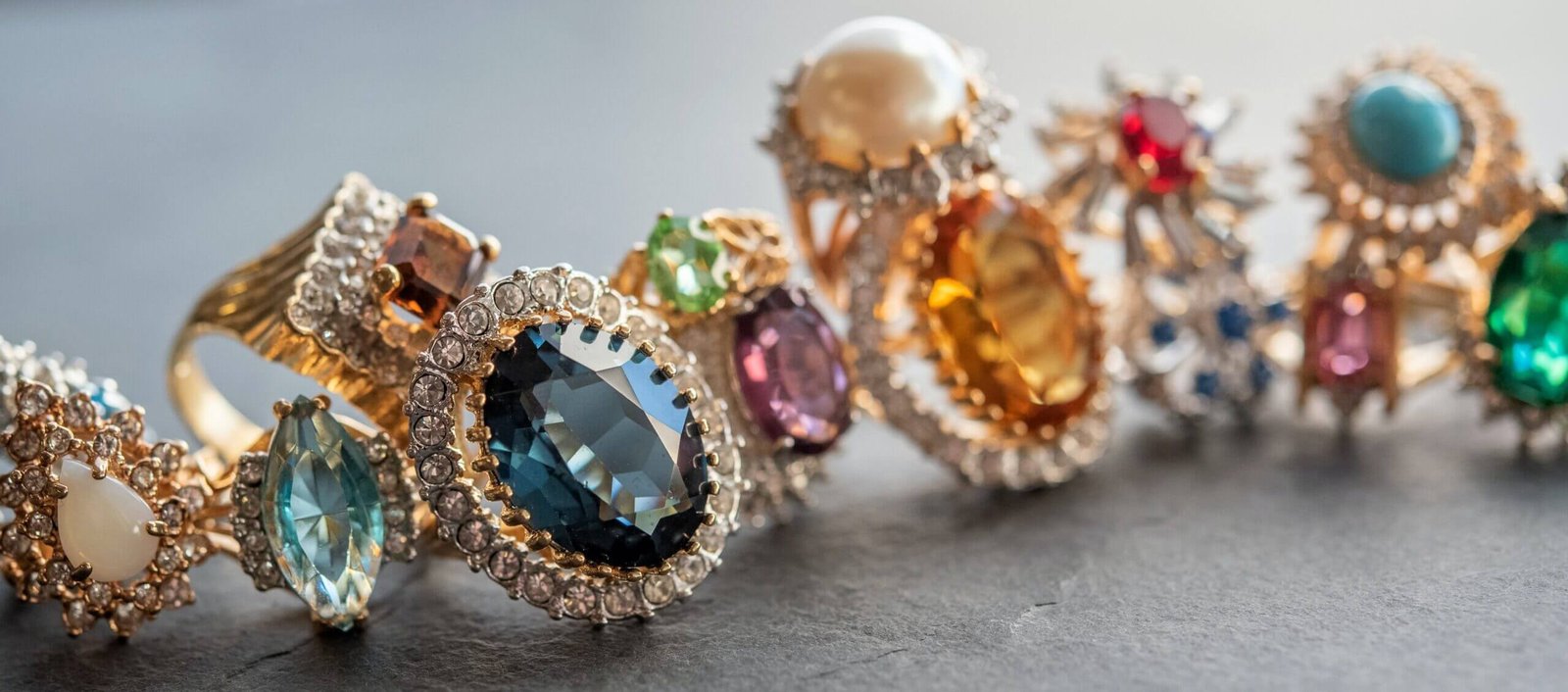Determining whether your gold is real can be quite the task, especially given its cultural importance in India and the stringent international standards for gold purity. You’ll soon be chuckling as you explore various methods to detect real gold, from scrutinizing hallmark stamps to performing simple at-home tests like the water and magnet checks. You’ll learn to spot tricky letter markings that reveal gold-plated from pure, and discover odd yet effective tests like the skin, vinegar, and ceramic tile methods. With these tips, you’ll be well-equipped to tell genuine gold from the frauds with confidence and a few laughs along the way. Have you ever found yourself eyeing a gold piece and wondering if it’s the real deal or just a glitzy imposter? Well, you’re not alone. Determining the authenticity of gold can be surprisingly tricky, but also a rather amusing adventure — think of it as a treasure hunt with a bit more science and fewer pirates.
Let’s dive into this hilarious yet informative journey to determine if your gold is the real McCoy, or if you’ve just bought your ticket to the “fool’s gold” club.

A Hilarious Introduction to Methods of Determining if Gold is Real
Why Bother?
You might ask, “Why should I bother finding out if my gold is real?” Well, considering gold has been worshipped like a rock star in India and its value is tied to international standards, it’s worth knowing if you’re owning or gifting the genuine stuff. After all, nobody wants to be duped.
Alright, enough chit-chat. Let’s dive into the nitty-gritty of separating the gold from the glitter!
Tip 1: Hallmarks — The Gold Standard of Gold Standards
Ever wonder why some gold items seem to have their own tiny graffiti? Those little stamps are your first clue. Hallmarks are an official way of identifying the gold content and often the manufacturer.
Hallmarks Demystified
Modern gold jewelry typically features two types of hallmark stamps:
- Millennial Fineness: It’s not a hallmark for Millennials but denotes the purity of gold by parts per thousand. For instance,
750means the piece is 75% gold. - Karats: This more familiar term represents purity in parts of 24. So,
24kpretty much screams pure gold at you, while18kis 75% gold, and so on.
But Wait, There’s a Catch: Like any good mystery, hallmarks can be faked. Plus, older pieces might have faded marks, leaving you squinting and scratching your head. If you spot something that looks like it’s been marked by a small child with a pin, you’re either in possession of an antique or a hoax.
Tip 2: Letter Markings — The Language of Fake Gold
Here’s where things get educational. Make sure to keep your monocle handy.
Decode the Markings
Take a closer look at your gold piece. If you spot any of these letters, your gold might need an asterisk:
- GP: Gold Plated. Imagine it’s like wearing a Halloween costume — only the surface layer is gold.
- GF: Gold Filled. It’s a bit more committed than GP, but still not entirely gold.
- GE: Gold Electroplated. Think of it as gold-flavored. It’s been through an electrochemical trick, which sounds cool but doesn’t add much value.
Examining these little letters will give you a clearer picture of what you’re holding. It’s like decoding the Da Vinci Code but for jewelry.
Tip 3: Skin Test — The DIY Dermatologist Approach
Feeling brave? Let’s bring this investigation into the personal space of your skin.
Rub and Observe
Here’s how you do it:
- Rub the Gold: Take the gold piece and rub it on your skin vigorously.
- Observe the Aftermath: Real gold plays nice with your skin and won’t cause any weird colors. Fake gold, on the other hand, might leave you looking like you’ve had a mishap with a crayon box — expect shades of black, blue, or green.
Now, this isn’t fail-proof, and it might sound a bit medieval, but it’s a quick way to start the process. Plus, it’ll give you some colorful insights, literally.

Tip 4: Water Test — Diving Deep into Your Gold’s Secrets
This one involves less contact and more observation. Plus, you get to play with water, which is always fun.
The Drop and Watch
Here’s how you can make waves with your gold:
- Fill a Glass with Water: Easy enough.
- Drop the Gold In: Real gold, being denser than almost everything, will sink like a rock. If you see it floating, well, it’s time to change your diet or accept that you’ve got some fake gold.
This simple science experiment can reveal a lot and make you feel like a gold-testing Neptune.
Tip 5: Magnet Test — The Attractive Approach
Magnets: Not just for your fridge anymore. Here’s why you need one in your detective kit.
Attraction or Repulsion
Gold hates magnets. Seriously, they don’t get along at all.
- Grab a Strong Magnet: We’re talking about those rare earth magnets that could hold up your fridge if it weren’t too heavy.
- Bring it Near the Gold: Real gold will stare blankly at the magnet and not respond. If your gold snaps to it like a tender moment in a rom-com, you’ve been duped.
Note: This gets trickier with gold-plated items. Sometimes, even those won’t react. It might leave you scratching your head, but hey, welcome to the gold-testing game.
Tip 6: Vinegar Test — The Tangy Truth Teller
Here’s where acidity comes in handy. Just don’t mistake it for salad prep.
A Drop of Truth
Vinegar can reveal quite a bit about your gold:
- Get Some White Vinegar: Any old kitchen will have some.
- Drop It on Your Gold: Watch like a hawk. Real gold remains indifferent, while fake gold reacts like your sibling when you borrow their clothes — it changes color, showing signs of distress.
This one is surprisingly effective and gives you the satisfaction of a proper chemical reaction without the need for goggles and lab coats.
Tip 7: Ceramic Tile Test — The Scrape of Destiny
Last but not least, we combine a little art with your scientific endeavors.
Scrape and Reveal
This involves a bit of bravery with your gold piece, but the results speak for themselves:
- Find an Unglazed Ceramic Tile: Make sure it’s unglazed, as the glazed ones won’t work.
- Scrape the Gold on It: Now, observe the streak left behind. Real gold leaves a gold mark. Fake gold, however, either leaves no mark or a rather unimpressive black streak.
It’s like a magic trick where the tile reveals the true nature of your shiny treasure.
Every Method Has Its Merits
In conclusion, combining these methods will provide a clearer picture of whether your gold is real. If you’re feeling particularly thorough or paranoid, use more than one method. After all, why leave the truth to chance when you can confirm it seven times over?
Table Summary for Quick Reference
| Test Method | What to Look For | Result for Real Gold | Key Notes |
|---|---|---|---|
| Hallmarks | Stamps indicating purity | Clear standards like 750 or 24k | Can be faked or faded |
| Letter Markings | Letters GP, GF, GE | Absence of such letters | Indicates non-pure gold |
| Skin Test | Rub on skin | No color change | Fake gold may color skin |
| Water Test | Drop in water | Sinks quickly | Fake gold may float |
| Magnet Test | Bring magnet near | No attraction | Gold-plated may also pass |
| Vinegar Test | Drop vinegar on gold | No color change | Fake gold changes color |
| Ceramic Tile Test | Scrape on unglazed ceramic tile | Leaves a gold mark | Fake leaves no mark/black streak |
When in doubt, you can always consult a professional jeweler, but where’s the fun in that? Master these tips, and you’ll be the Sherlock Holmes of gold verification, minus the deerstalker hat. Here’s to hoping your trinkets shine genuinely bright!
